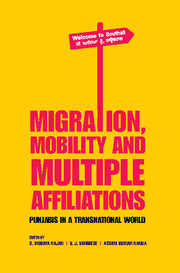Book contents
- Frontmatter
- Contents
- List of Tables and Figures
- Preface
- Acknowledgements
- Transnational World and Indian Punjab: Contemporary Issues
- Part I A Historical Survey
- Part II Shifting Contours of Migration
- Part III Social Structures and Organizational Links
- Part IV Education and Migration
- Part V Family Networks
- 13 Punjabis in Italy: The Role of Ethnic and Family Networks in Immigration and Economic Integration
- 14 Gender, the Life Course and Home Making across Tanzania, Britain and Indian Punjab
- 15 Inter-generational Tensions and Cultural Reproduction in a Punjabi Community in England
- Contributors
- Index
14 - Gender, the Life Course and Home Making across Tanzania, Britain and Indian Punjab
from Part V - Family Networks
Published online by Cambridge University Press: 05 March 2016
- Frontmatter
- Contents
- List of Tables and Figures
- Preface
- Acknowledgements
- Transnational World and Indian Punjab: Contemporary Issues
- Part I A Historical Survey
- Part II Shifting Contours of Migration
- Part III Social Structures and Organizational Links
- Part IV Education and Migration
- Part V Family Networks
- 13 Punjabis in Italy: The Role of Ethnic and Family Networks in Immigration and Economic Integration
- 14 Gender, the Life Course and Home Making across Tanzania, Britain and Indian Punjab
- 15 Inter-generational Tensions and Cultural Reproduction in a Punjabi Community in England
- Contributors
- Index
Summary
Introduction
This chapter focuses on the Rai household who, over three generations, have created and maintained ‘home's across Indian Punjab, Tanzania and England. The Rai household are part of a larger Punjabi diaspora that spans, historically, from Indian Punjab to Eastern Africa and to the United Kingdom and/or North America. The Rais, like many other households, maintain key social relationships across the three sites and the creation, establishment and relocation of family members and homes is related to the developmental stages of the household involving death, marriage, the dissolution of resources, birth and so on. By focusing on what Bryceson and Vuorela (2006) term the ‘inner logic of the family and their extended networks’, the chapter asks two broad questions: what are the dynamics of transnational households and how do these relate to the household development cycle, gender and the life course? What is the role of women in the creation and maintenance of households across places?
The author conceptualizes the household to be made up of positioned (gender and age) members who are on a journey across their own life courses. Correspondingly, the focus shifts through the course of the chapter, bringing to the fore different agendas and practices of home making. Nevertheless, the author focuses on Mrs Rai, an elderly widow, whose complaints of old age to her family were an emotive vehicle through which to convey her desire for all the family to live together in one place. However, this desire is contradictory as movement across places by members in light of their gender identities and stages in the life course has afforded the very social, economic and symbolic mobility that, in turns, enables the Rais to remain unified in dispersal. The relationship between geographic mobility, which, in turn, creates social mobility and status, and women's activities runs throughout the case study. The author argues that women's activities of care and nurture are central in the establishment of homes across geographical places, although this varies according to their stage in the life course and is mediated by place (understood as social location as well as spatially).
Background
This chapter draws on fieldwork conducted between 1999 and 2001 as part of the author's doctoral thesis entitled ‘Gendered places, transnational lives: Sikh women in Indian Punjab, Tanzania and Britain’ (Mand, 2004).
- Type
- Chapter
- Information
- Migration, Mobility and Multiple AffiliationsPunjabis in a Transnational World, pp. 338 - 359Publisher: Cambridge University PressPrint publication year: 2015
- 1
- Cited by



